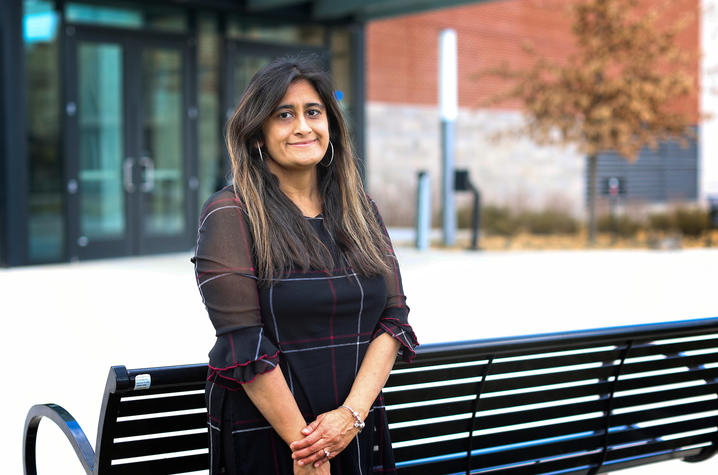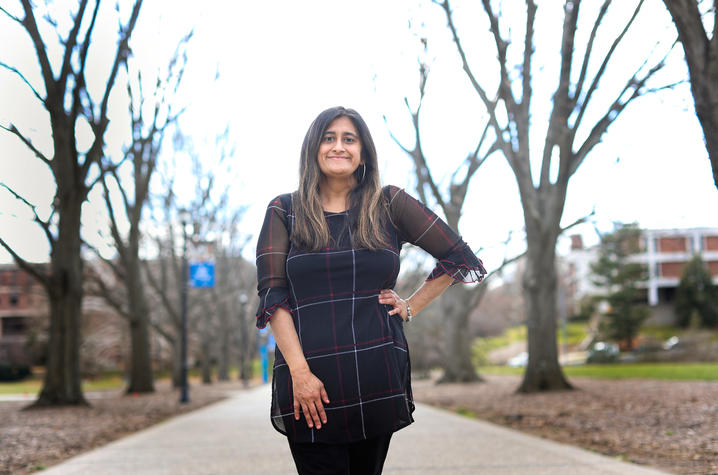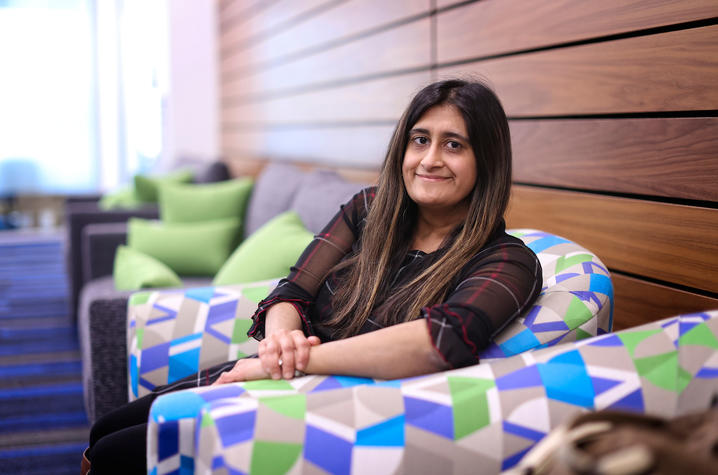‘Never be Afraid to Get the Help you Need’: UK Senior Credits DRC With Academic Success
LEXINGTON, Ky. (March 31, 2022) — It was her second semester in college and Eman Sheikh admits that she was “all over the place” — emotionally, socially and academically.
What should have been one of the most exciting times in her life — beginning her college career at the University of Kentucky — was turning out to be the hardest. After losing her father and struggling with attention deficit hyperactivity disorder (ADHD), Sheikh was lost.
A Lexington native, Sheikh majored in business her first year, following in her father’s footsteps. While she studied constantly, her grades continued to slip.
“His death had a big impact on me,” Sheikh explained. “After a semester, I was depressed because of my grades and the passing of my dad, so I had to find another major that was a better fit for me.”
Grappling with her new reality, Sheikh sought out help through the Kentucky Office of Vocational Rehabilitation in Lexington. It was here that she was connected to the Disability Resource Center (DRC).
The DRC, housed in the Office for Student Success at UK, holds a crucial and appreciated role in securing access for students with disabilities and provides services to the university community so that students with disabilities have an equal opportunity to fully participate in all aspects of university life.
Once Sheikh met with the DRC, they began to establish a plan of action.
“I realized that I was working harder and not smarter,” Sheikh said.
Although Sheikh’s desire was to follow in her dad’s footsteps, she knew ultimately her dad would want her to be happy. So, she switched her major to elementary education, and with the help of her DRC advisor, began working on her time management skills.
Sheikh's story is one that is more common than we’d like to think. Roughly one in nine college students worldwide has an ADHD diagnosis.
These students represent a distinct and auspicious population.
Starting last November, the university created a series titled “Many People Creating One Accessible Community” highlighting disabilities like Sheikh’s and ways the campus community can step up to ensure UK is welcoming and accessible for all.
For those living with ADHD, tackling the challenges of college on top of managing their ADHD and any outside factors — like in Sheikh’s case the death of her father — can seem overwhelming.
Given the unique factors that influence the college experience for students with ADHD, this population merits dedicated attention from clinicians, educators, families and institutions of higher education themselves.
The Americans with Disabilities Act (ADA) allows for individuals who qualify to be eligible for specific accommodations, including extended time on tests and an assigned note-taker. The DRC can help students navigate these accommodations.
While college students with ADHD benefit immensely from on-campus resources and support, data show that these students use these services at alarmingly low rates.
Sheikh admits that reaching out to the DRC was daunting at first, but wants to encourage other students to take the leap like she did.
“The DRC is there to help you to become a better student and to help you succeed in life,” Sheikh said. “The DRC impacted my college career in such a positive way. They made me more confident in my studies, and they were able to positively help me with my time management skills and stress levels.”
David Beach, director of the DRC, says the DRC is here to help in whichever way students need them and can be wherever students need them to be.
The DRC offers:
- Consultation Services
- Accommodated Test Proctoring Services
- Alternative Text and Assistive Technology Services
- Deaf/Hard of Hearing
- Service and Comfort Animal Registration
- Temporary Disability Services
- Workforce Recruitment Program
- Door to Door Transportation Services
“When reaching out to the DRC, students can expect that we will carefully listen to their requests for accommodations to determine, on an individualized basis, how the disability impacts the student and the accommodations necessary for the student to have an equitable opportunity to seek their degree,” Beach said.
Helping students with disabilities is the DRC’s sole focus, however, the weight of that responsibility falls on the entire campus community.
While UK is determined to continue building upon its missions of teaching, service, research and healing, we can only accomplish our goals when we take care of our people.
At UK, we are one community — a family comprised of many individuals whose differences should be celebrated and understood. To do that, Beach believes there are a few things we should keep in mind when considering students with disabilities.
“I think the first thing to note is being careful about language regarding disabilities,” Beach said. “Terms or phrases that disparage people with disabilities can be very damaging to those who are living with a disability. These statements can shame an individual and make them feel unwelcome and discourage reaching out when they are in need of support. Students can best support by creating environments of empathy and offer the opportunity to vocalize their needs without fear of reprisal or judgment.”
This May, Sheikh will graduate with a degree from the College of Education and plans to apply for elementary education teaching positions in Kentucky this summer.
Sheikh's main takeaway from the last four years?
“Never be afraid to get the help you need.”
The DRC is available to answer any questions related to meeting the needs of university students with disabilities and how to create accessible and welcoming spaces. You can visit their website here or call them at 859-257-2754.
To read more about the “Many People Creating One Accessible Community” series, search #OneUKforAll on UK’s Facebook and Twitter.
As the state’s flagship, land-grant institution, the University of Kentucky exists to advance the Commonwealth. We do that by preparing the next generation of leaders — placing students at the heart of everything we do — and transforming the lives of Kentuckians through education, research and creative work, service and health care. We pride ourselves on being a catalyst for breakthroughs and a force for healing, a place where ingenuity unfolds. It's all made possible by our people — visionaries, disruptors and pioneers — who make up 200 academic programs, a $476.5 million research and development enterprise and a world-class medical center, all on one campus.







